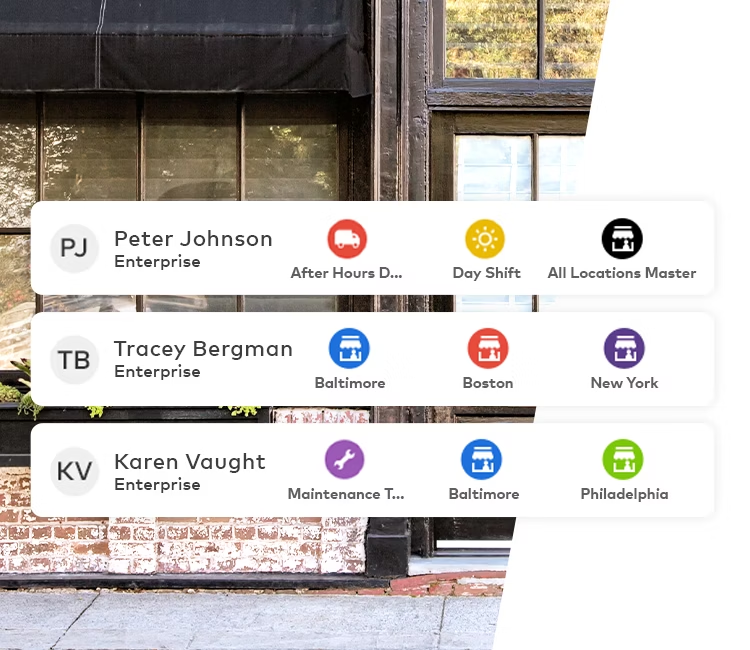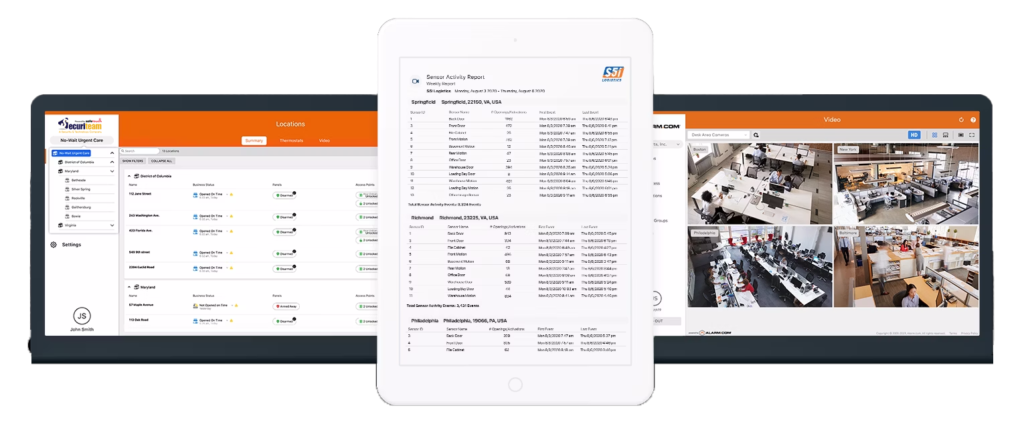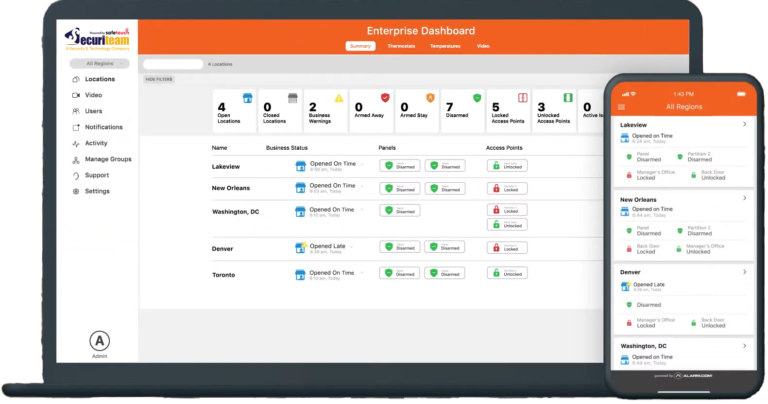Struggling with multi location management? This article provides actionable strategies for multi location management, to streamline operations, ensure consistency, and leverage AI analytics across all your business locations. Get insights to enhance efficiency and stay competitive in the realm of multi location management.
Multi-Location Management & AI Analytics to Increase Productivity, Profits & Efficiency.
AI analytics significantly enhance multi-location management by automating data analysis and providing real-time insights to inform data-driven decisions, leading to improved efficiency and customer satisfaction.
AI-powered tools in various sectors, such as retail and hospitality, optimize inventory management, personalize customer experiences, and ensure brand consistency, which collectively drive operational growth and customer loyalty.
Data security and privacy are crucial in AI analytics; businesses must adopt robust measures to ensure the ethical use of AI and compliance with regulations to maintain consumer trust.
Introduction
In the realm of multi-location management, the emergence of artificial intelligence (AI) has heralded a revolution. The days of laborious data crunching and manual analysis are giving way to an era where AI analytics paves the way for unprecedented efficiency and productivity. This is not just about embracing new technology; it’s about evolving with it to stay competitive and relevant in a rapidly changing business landscape.
AI analytics transcends traditional data analytics by employing machine learning algorithms to parse through text data, extract key insights, and respond to explicit instructions or even simple prompts. Imagine the possibilities when these insights inform every business decision, leading to a streamlined operation poised for the next stage of growth. According to industry leaders, AI’s transformative impact is undeniable, with a staggering 95% of multi-location marketers affirming its significant influence on their strategies. Harnessing the power of AI data can truly revolutionize the way businesses operate.
Leveraging AI Analytics for Multi-Location Management
Businesses seeking to enhance customer experience and drive revenue must harness the potential of AI analytics in multi-location management. By leveraging powerful AI analytics tools, companies can:

- Aggregate and analyze data from multiple sources
- Yield insights that drive data-driven decisions
- Adopt machine learning models and predictive analytics
- Enable a real-time understanding of market dynamics
- Ensure that each location operates at peak performance
AI analytics goes beyond just processing data; it transforms it into business intelligence that propels organizations forward. Some benefits of using AI analytics include:
- Replicating best practices across different locations to enhance operational efficiency
- Reacting swiftly to market changes and customer demands
- Providing speed and granularity that traditional data analytics cannot achieve
Using a powerful AI analytics tool can help businesses stay competitive and make informed decisions.
Marketers recognize the transformative nature of AI in multi-location management, with an impressive 95% acknowledging its role in shaping marketing strategies. This speaks volumes about AI’s role in the present and future of business, where using AI is no longer an option but a necessity for those who wish to lead the market.
AI-Powered Demand Forecasting and Inventory Optimization
AI-powered demand forecasting and inventory optimization are now game-changers in the dynamic world of retail chains and restaurants. These AI tools employ sophisticated machine learning algorithms to analyze historical sales and external factors, making accurate predictions that help businesses avoid the pitfalls of overstocking or inventory shortages. This level of precision in forecasting demand not only saves on costs but also ensures that customers find what they need when they need it, thereby improving customer satisfaction.
Moreover, AI analytics aid in supply chain planning, providing granular insights that far exceed the capabilities of traditional methods. Multi-business management software with AI analytics can sift through various data points to predict product demand, leading to smarter inventory management. As a result, retail chains and restaurants can better manage inconsistent inventory levels, a common challenge in the industry.
Far from being a distant vision, the integration of AI-powered tools in multi-location management is a current reality that empowers businesses to make decisions that align with their operational goals based on data. By using AI to optimize inventory, companies can ensure that their products are in the right place at the right time, substantially reducing the risk of lost sales and dissatisfied customers.
Enhancing Brand Consistency and Personalization in Hotel Chains
Hotel chains, with their myriad of locations, stand to benefit significantly from the personalization and brand consistency that AI analytics can offer. Through the analysis of guest data and booking behavior, AI algorithms can tailor guest experiences, ensuring that the brand’s ethos is reflected consistently across all touchpoints. This consistency is vital for establishing trust and loyalty among guests, who come to expect a certain level of service and ambiance regardless of which property they visit.

AI’s role in the hospitality sector extends to:
- Enhancing operational efficiency
- Providing guests with personalized recommendations and control over room features through smart in-room assistants
- Enabling hotel chains to personalize marketing efforts effectively through AI-driven analytics
These advancements not only impress guests but also align with the brand’s commitment to service excellence, delivering tailored offers and services that resonate with each guest’s preferences.
Hotel chains can significantly boost customer satisfaction by integrating AI analytics into their operations. AI tools analyze guest feedback and sentiment, allowing for a uniform response to issues and a consistent brand image that guests can rely on wherever they go.
Optimizing Resource Allocation in Professional Services Firms
AI analytics can also make a substantial impact in the professional services sector, especially in areas like client segmentation and resource allocation. By analyzing vast datasets, AI-driven customer segmentation uncovers patterns and relationships, grouping clients with similar attributes for more targeted and effective marketing messages. This precision not only enhances the firm’s marketing efforts but also allows for a more strategic allocation of resources, focusing on the most lucrative client segments.
AI-driven segmentation goes through stages such as:
- Data collection
- Processing
- Data analysis
- Modeling
- Interpretation
This ensures that every client is understood in depth, which in turn enables organizations to serve them better. With these insights, professional services firms can tailor their offerings to meet the specific needs of each client segment, thereby improving customer satisfaction and optimizing the use of company resources.
Firms can use multi-business management software with AI analytics to analyze client data, project types, and historical performance, thereby making informed decisions about resource allocation and project management. This level of data-driven decision-making ensures that the firm’s talents and assets are utilized in the most efficient way possible, ultimately leading to better outcomes for both the firm and its clients.
Streamlining Operations with AI-Driven Insights
AI analytics offer vast operational benefits in multi-location businesses, notably the ability to:
- Automate routine tasks
- Improve resource management
- Identify trends and patterns that can inform operational decisions
- Automate complex tasks such as reservation management in the hospitality industry or stock replenishment in retail, ensuring consistency and efficiency across all locations.

AI insights also play a crucial role in data exploration and gaining a better understanding of business operations. Through the use of powerful AI analytics tools, businesses can generate insights that enable them to:
- Uncover inefficiencies and optimize their processes
- Analyze unstructured data, such as customer feedback or social media interactions
- Improve customer satisfaction
- Streamline operations
These insights provide valuable information that can help businesses make informed decisions and drive growth.
Moreover, AI analytics can assist in predictive maintenance, identifying potential equipment failures before they occur and scheduling timely repairs, thus avoiding operational disruptions. By using AI to identify patterns and forecast potential issues, businesses can proactively manage their resources, resulting in more efficient and reliable operations.
Improving Customer Satisfaction with AI Analytics
Improving customer satisfaction is the ultimate goal of any business, and AI analytics is pivotal in achieving this objective. By personalizing content and enhancing customer engagement, AI analytics provide tailored solutions that resonate with individual customer needs. The use of machine learning models and ai algorithms can uncover insights from customer data, enabling businesses to deliver a more personalized experience that fosters loyalty and repeat business.

Sentiment analysis, a facet of AI analytics, allows businesses to understand the emotions behind customer feedback, paving the way for more empathetic and effective communication. This level of understanding is crucial in addressing customer concerns and improving the overall customer experience. Some benefits of sentiment analysis include:
- Identifying customer sentiment towards products or services
- Monitoring brand reputation and customer satisfaction levels
- Identifying trends and patterns in customer feedback
- Personalizing customer interactions and responses
- Improving customer support and response times
AI-powered chatbots, for example, provide round-the-clock customer support, ensuring that inquiries are handled promptly and consistently, which is vital for maintaining high customer satisfaction levels.
Furthermore, AI analytics can predict customer behaviors such as churn, allowing businesses to take proactive steps to retain their customer base. Predictive analytics can also help businesses identify the causes behind a sales decrease or spot opportunities to attract new customers, ensuring that their strategies are always one step ahead. By leveraging AI to analyze data and generate insights, businesses can not only meet but exceed customer expectations, securing a competitive edge in the market.
Ensuring Data Security and Privacy in AI Analytics
Despite the numerous advantages offered by AI analytics, it also presents challenges regarding data security and privacy. The collection and analysis of large datasets bring about concerns regarding the safekeeping of sensitive personal information, which could be inferred even when not explicitly shared. As such, it is imperative for developers, data analysts, and data scientists to integrate privacy, security, and monitoring measures into their AI analytics tools to safeguard user data.
Compliance with strict laws and regulations is a must, and businesses must ensure that only the necessary data types are collected and maintained securely. Users must be informed and given the option to consent to the use of their data by AI systems, fostering transparency and building trust. Marketers are increasingly seeking AI solutions that prioritize data security and regulatory adherence, recognizing the importance of consumer trust in the digital age.
Looking to the future, by 2028, the goal is to enhance privacy assurance through secure personal data management as technology advances. This focus on data security and privacy is not only about protection but also about the ethical use of AI, ensuring that businesses can leverage the power of AI analytics without compromising their customers’ trust.
Future Trends in AI for Multi-Location Management
Looking towards the horizon, the future holds exciting developments for AI in multi-location management. One of the notable trends is the increased integration of AI with existing systems, a task that requires significant technical expertise but yields substantial rewards. The ability to automate report generation will streamline the way businesses review and act on their data, freeing up valuable time for strategic decision-making.
Enhanced natural language processing capabilities are becoming increasingly important, enabling businesses to generate on-brand responses to online reviews and social media engagements with greater accuracy and efficiency. This evolution of AI models, including statistical models and neural networks, will further enable businesses to engage with their customers in meaningful ways that reflect their brand voice and values.
Another trend that cannot be ignored is the steadfast focus on data security within AI analytics. As AI models continue to evolve, so too do the methods of ensuring that data is handled with the utmost care, maintaining privacy and compliance as top priorities. These trends not only hint at a future where AI is deeply embedded in multi-location management but also one where its application is responsible and respectful of user privacy.
Summary
As we’ve explored throughout this comprehensive guide, AI analytics is revolutionizing the way businesses manage their multi-location operations. From enhancing customer satisfaction to optimizing inventory and resources, AI provides actionable insights that drive efficiency, productivity, and profitability. The integration of AI in multi-location management is no longer a futuristic concept but a current imperative for businesses looking to thrive in a competitive landscape.
Embracing AI analytics is about harnessing the power of data to inform smarter, faster, and more effective business decisions. As technology continues to advance, the potential for AI to impact multi-location management will only grow, offering businesses an invaluable tool for success. Let’s step into this new era with confidence, knowing that AI is not just transforming our operations—it’s shaping the future of business itself.
Frequently Asked Questions
What is multi-location management?
Multi-location management refers to the management of businesses that operate out of multiple locations. The practicalities of multi-location management depend on context.
How does AI improve inventory management in retail and restaurants?
AI uses machine learning to analyze sales data and external factors, leading to more accurate inventory predictions and improved supply chain planning, ultimately increasing customer satisfaction.
Can AI help in maintaining brand consistency across hotel chains?
Yes, AI analytics can ensure a consistent brand experience and personalized guest services across all hotel locations by analyzing guest data and booking behavior.
What role does AI play in professional services firms?
AI plays a crucial role in professional services firms by enabling client segmentation, efficient resource allocation, and optimizing project management for the most profitable client segments.
Is data security a concern with AI analytics?
Yes, data security is a significant concern with AI analytics, and developers are taking measures to protect user data and comply with regulations to ensure ethical use of technology.






